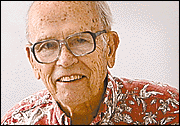


Hawaii’s World
THE deputy surgeon general of the United States, No. 2 person in the U.S. Public Health Service, grew up near Central Intermediate School in Honolulu. Public health defender
from HawaiiRear Adm. Kenneth P. Moritsugu, 54, is a for-real local boy made good. He was educated at the now-defunct Sacred Hearts Seminary, Hauula, for his high school years, Chaminade College and the University of Hawaii before he got a medical degree from Georgetown University, Washington, D.C., and a master's degree in public health from the University of California at Berkeley.
In public he just about always wears the Navy-like white uniform and shoulder boards former Surgeon General Everett Koop brought to prominence when he lashed out against smoking and mailed HIV/AIDs information to every home in America.
Moritsugu serves with Surgeon General David Thatcher, who appointed him deputy last Oct. 1. Before that he had been Koop-appointed as one of 50 assistant surgeons general in a corps of 6,000 health officers, all with professional degrees. He still keeps in touch with Koop.
Thatcher and Moritsugu meet weekly to discuss how the Public Health Service can best focus its efforts and best use its national pulpit. Prevention, detection and intervention against health threats have been a USPHS aim for 201 years.
Thatcher carries forward the smoking and HIV awareness crusades begun by Koop and works to put down hepatitis B and a tuberculosis resurgence.
A further focus is on "insidious health threats" -- the growing obesity of children and adults, and the decline of aggressive physical education in the schools. Moritsugu reminded me we all will have better odds with heart disease, cancer and other ills if we exercise, avoid obesity, don't smoke and maintain a healthy diet.
USPHS staged historic successful battles against malaria, leprosy, small pox, yellow fever, cholera and polio. It now keeps its guard up against resurgences.
Moritsugu's interest in preventive medicine led him to join the Public Health Service in San Francisco in 1971. Its officer rankings, pay and benefits parallel naval officers.
MORITSUGU'S father, Richard Yutaka Moritsugu, 85, lives in Palolo Valley with his daughter, the admiral's sister. Their grandfather came to Hawaii from Japan as a fisherman.
The admiral was in Hawaii at the end of April to honor Hawaii organ sharers at a Washington Place reception. We in Hawaii are at the bottom of the states in volunteering our organs for others to use after we die. The national record is no good, either -- an average 65,000 needy versus 20,000 available donors.
Organ sharing is very personal with Moritsugu. Both his late wife and daughter, the latter killed by an auto crash, donated organs. He does not know the names of the recipients but does know, for example, that a widowed mother of five is able to go on caring for her family with a replacement heart from a Moritsugu.
He urges: "Don't take your organs to heaven. Heaven knows we need them here."
A.A. Smyser is the contributing editor
and former editor of the the Star-Bulletin
His column runs Tuesday and Thursday.